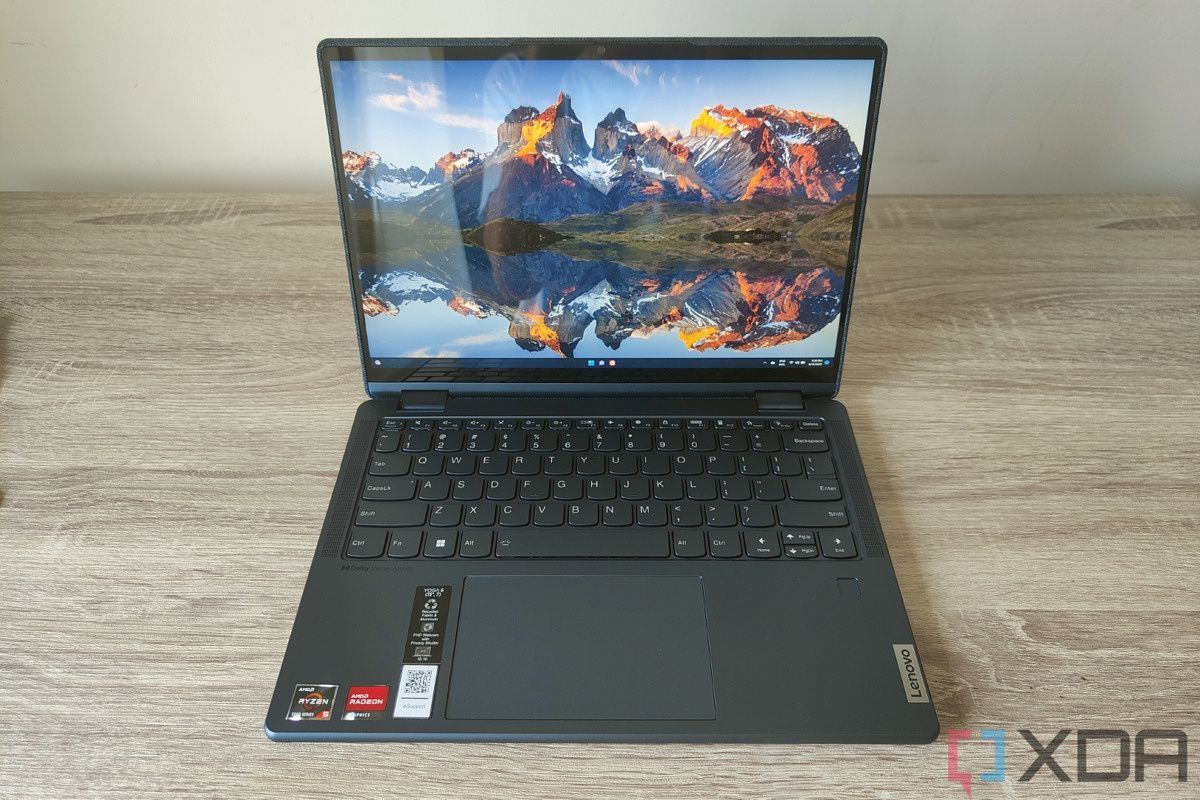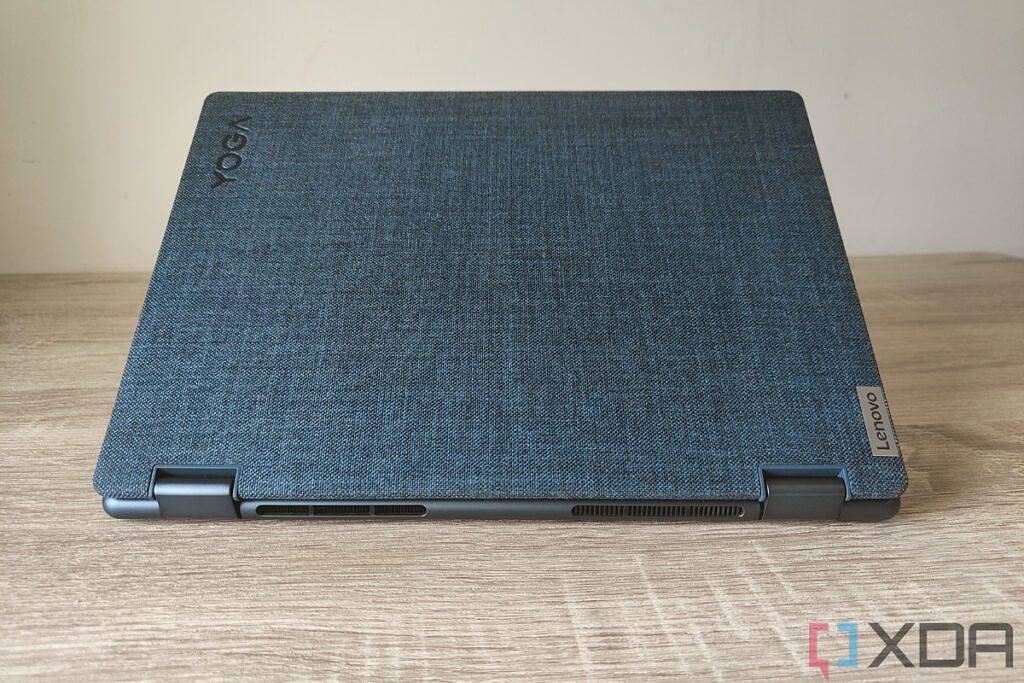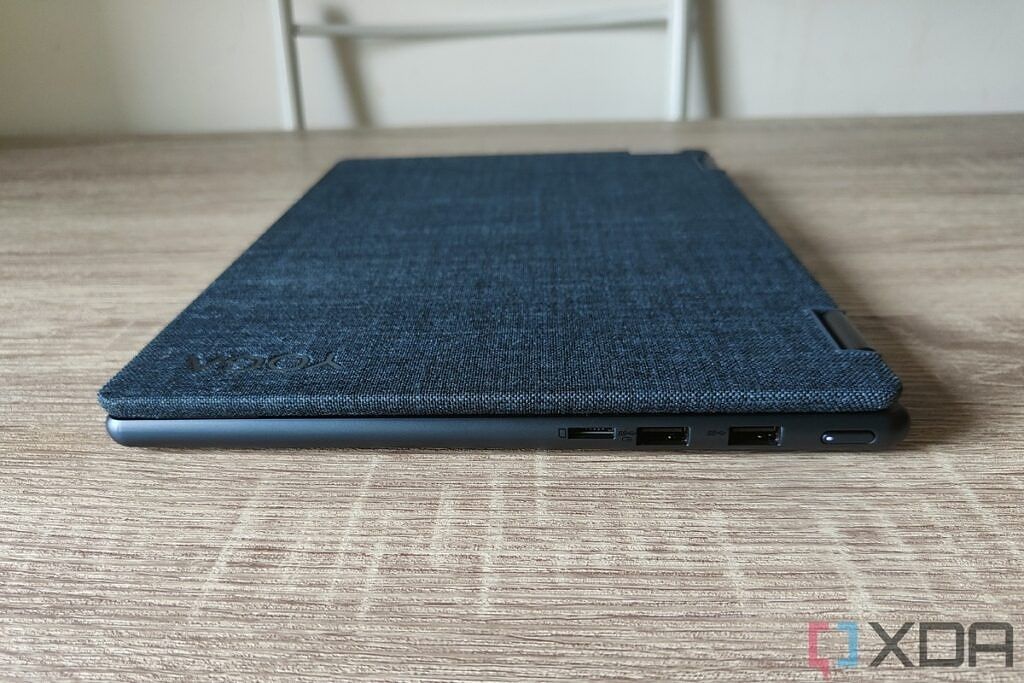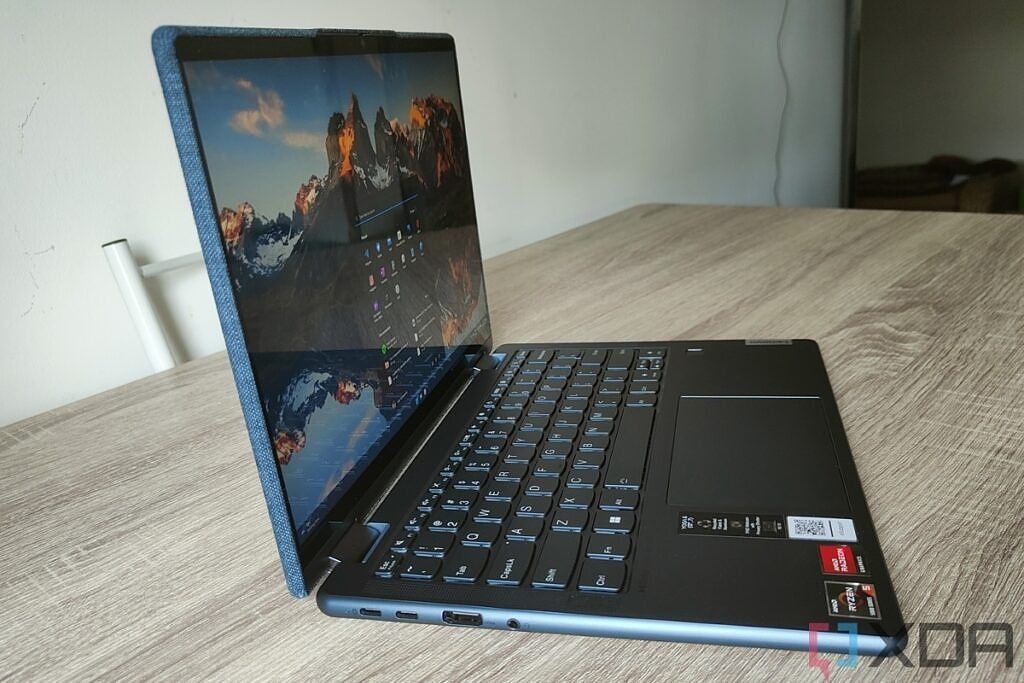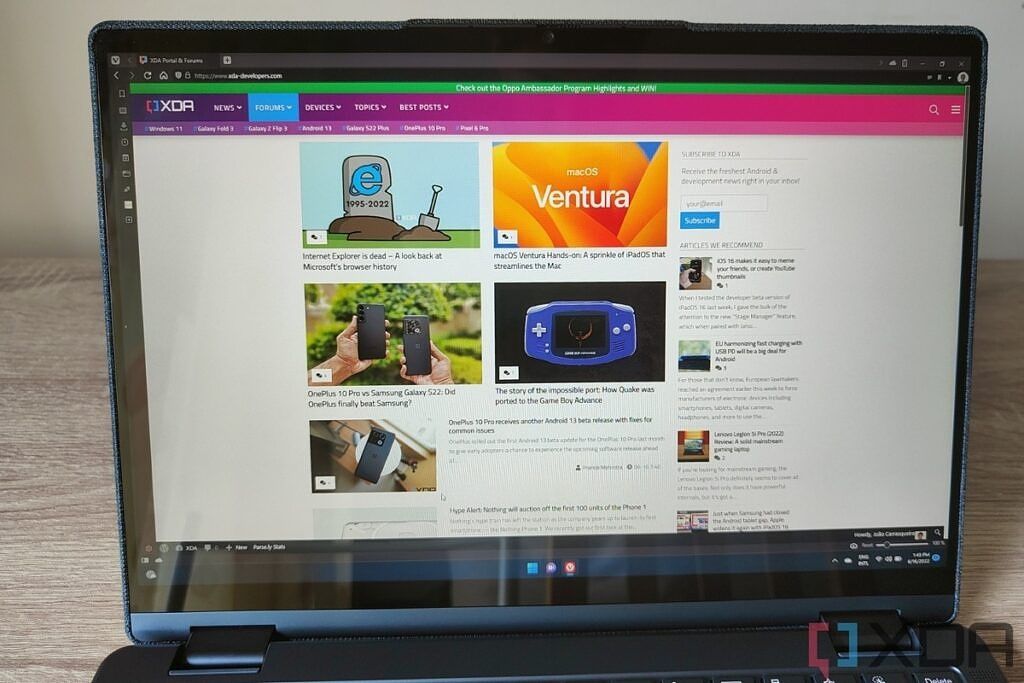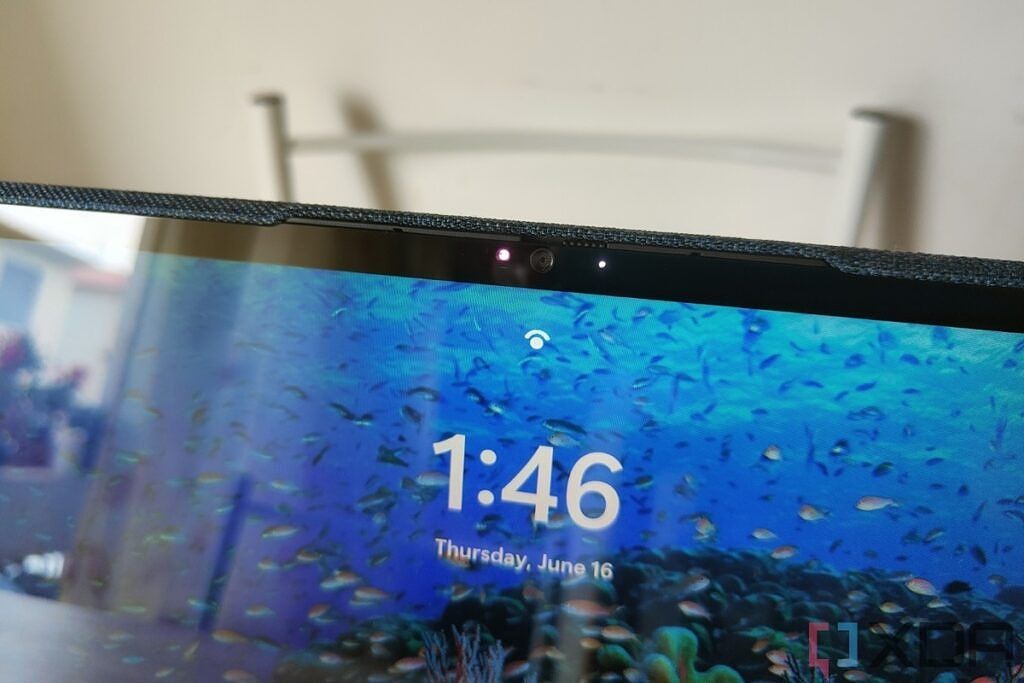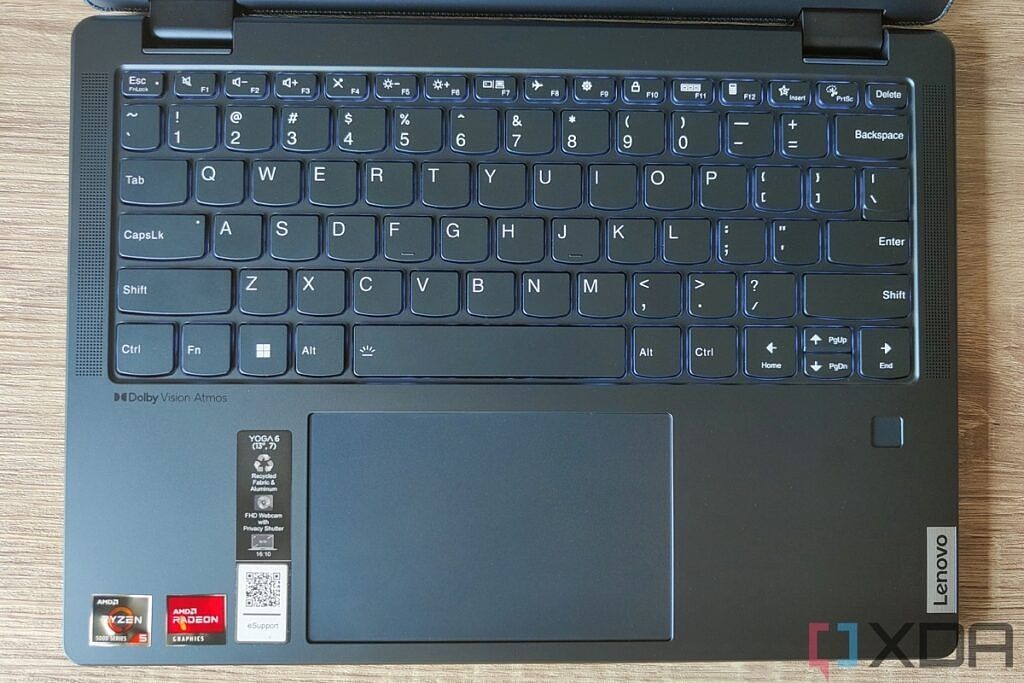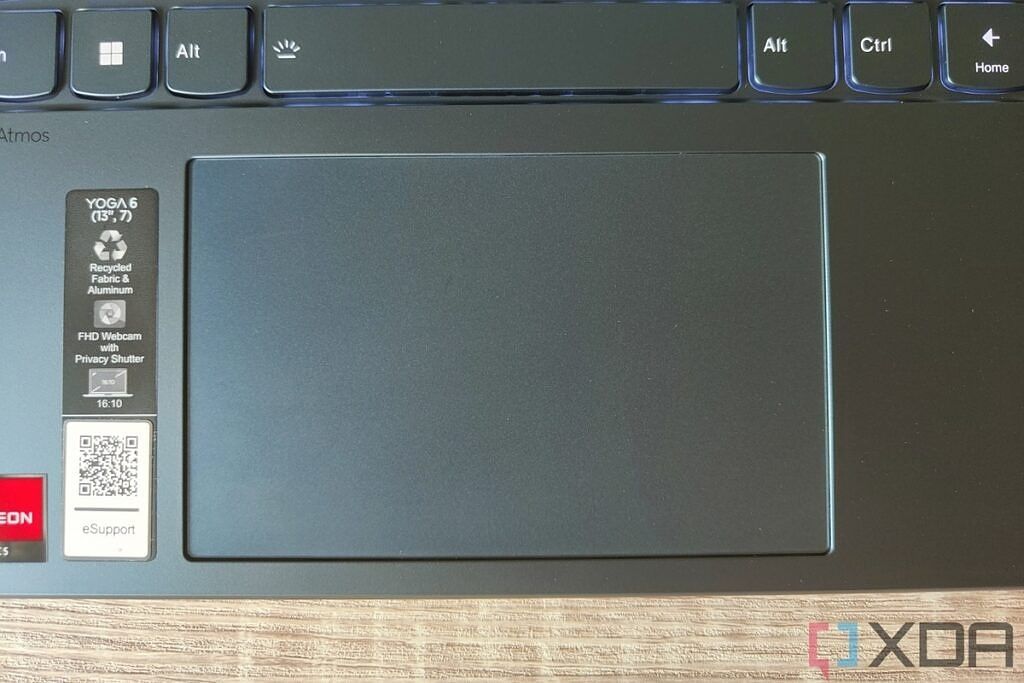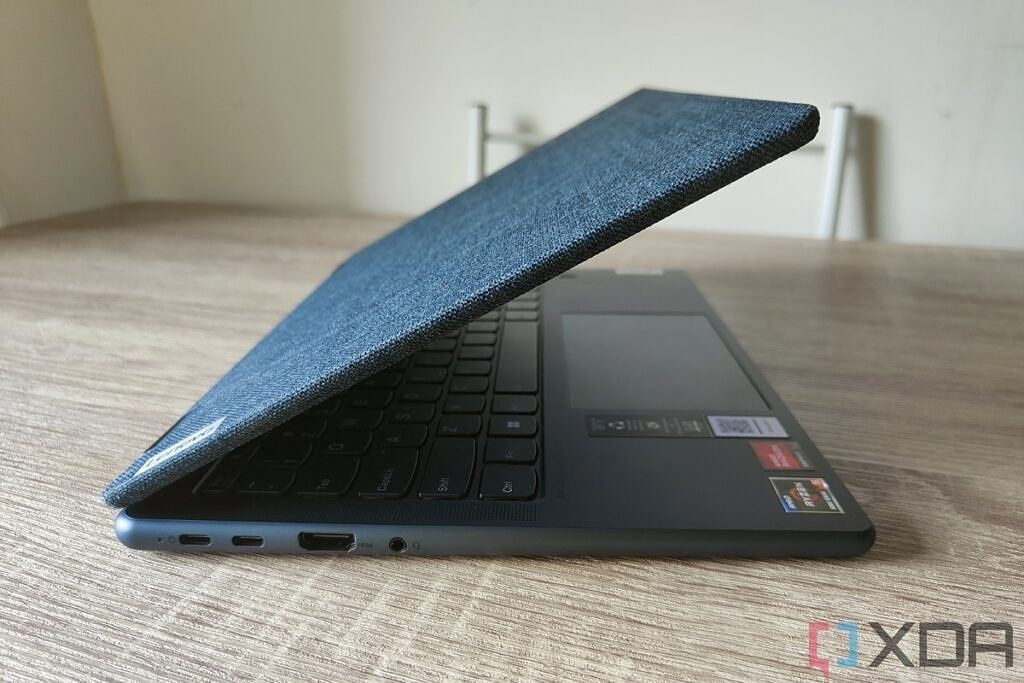Late last year, I got to review the Lenovo Yoga 6, one of the company's most budget-oriented convertibles, and I admittedly liked a lot about it. It was powered by fast AMD processors, it looked and felt great with its fabric-covered lid, and it otherwise nailed all the basics. It wasn't without its problems, but when I got the chance to review its successor, I was very happy to do so.
I did have some issues with the last-generation model of the Yoga 6 - the lack of an HDMI port, the poor webcam, and some other downsides made it a little hard to truly love it. But for this year, it feels like Lenovo listened to every single one of my pain points and addressed them. The Lenovo Yoga 6 feels almost like the perfect entry-level convertible now. Lenovo didn't upgrade the processors, but everything else is better in this new model, and if you want a convertible laptop for a reasonable price, this should absolutely be on your radar.
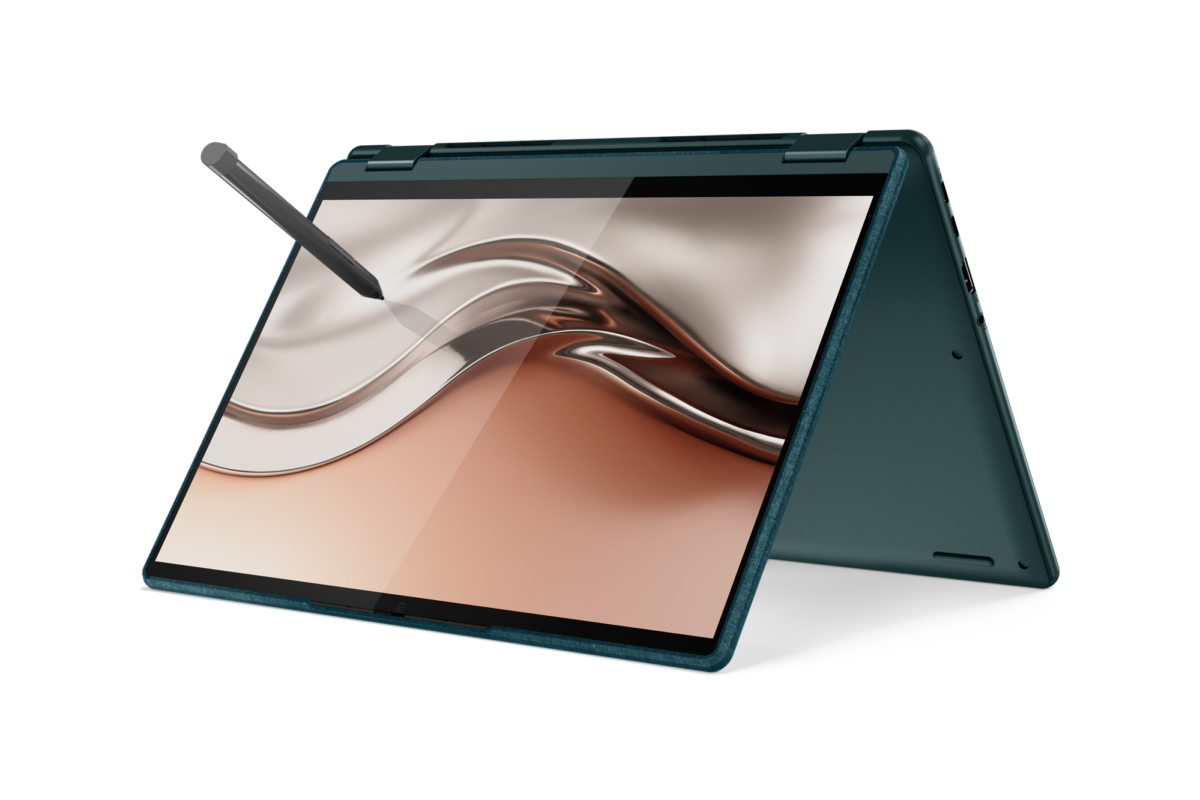
Lenovo Yoga 6
The Lenovo Yoga 6 is an affordable convertible with a unique design, and this generation includes some big upgrades.
Navigate this review:
- Lenovo Yoga 6 Gen 7: Pricing and availability
- Lenovo Yoga 6 Gen 7: Specs
- Design: It's even more beautiful than before
- Display: It's got a 16:10 aspect ratio now
- Keyboard and trackpad: They're as solid as ever
- Performance: It's using last-gen processors, and that's ok
- Should you buy the Lenovo Yoga 6 Gen 7?
Lenovo Yoga 6 Gen 7: Pricing and availability
- The Lenovo Yoga 6 Gen 7 officially starts at $749.99, though you can already find it cheaper than that
- It's available directly from Lenovo and at Best Buy, but not every configuration is available everywhere
Lenovo announced the Yoga 6 Gen 7 back at CES 2022, and it launched in the second quarter of 2022. Officially, the laptop starts at $749.99, but Lenovo's website already has the base model going for as low as $599.99, which makes this laptop an even better deal. That price includes an AMD Ryzen 5 5500U, 8GB of RAM, and 256GB of SSD storage, which is a fantastic deal for a convertible laptop like this.
If you don't want to buy from Lenovo directly, you can also find the laptop at Best Buy, though only a couple of configuration options can be found there right now. More options could become available later on, and they should also start showing up at other retailers over time.
Lenovo Yoga 6 Gen 7: Specs
CPU | AMD Ryzen 5 5500U (6 cores, 12 threads, up to 4.0GHz, 8MB cache) |
|---|---|
Graphics | Integrated AMD Radeon Graphics (7-core, 1800MHz) |
Display | 13.3-inch IPS, WUXGA (1920 x 1200), 170 DPI, 100% sRGB, up to 300 nits, TUV Low Blue Light, Dolby Vision, touch |
Body | 304 x 218 x 17.45 mm, 1.37kg |
Memory | 8GB LPDDR4x-4266 |
Storage | 256GB NVMe PCIe SSD |
Battery | 59Wh battery |
Ports |
|
Audio | Dual 2W stereo speakers with Dolby Atmos Dual array microphones |
Connectivity | Wi-Fi 6 Bluetooth 5.1 |
Camera | 1080p Full HD webcam with IR, privacy shutter |
Color | Dark Teal |
Material | Aluminum + fabric (top), ABS (bottom) |
OS | Windows 11 Home |
Price | $749.99 |
Design: It's even more beautiful than before
- The Lenovo Yoga 6 comes with a lid covered in fabric, which gives it a distinct look and feel
- The edges of the base are now fully curved, giving it a more modern look and making it more comfortable to hold
- This time, there are plenty of ports for all your peripherals
The design was one of my absolute favorite things about the Lenovo Yoga 6 when I reviewed it last year, but the company still went ahead and improved it. Just like with the previous model, the lid of the laptop is covered in a dark blue fabric, and it makes the Yoga 6 really stand out from the sea of metal laptops out there. But now, Lenovo has also modernized the design, in line with what happened with the Yoga 9i, which we've also reviewed (and loved).
The edges of the base are now fully curved, making for a laptop that just looks more appealing than it did with the old flat edges. If you buy a model of the laptop with the aluminum top cover rather than the fabric-covered one, you'll also see the curved edges there. In addition to looking great, this also makes it easier to hold the laptop in your hand, because the smooth rounded edges don't dig into your palms as much.
The chassis has a more balanced design this year.
On the more mechanical side, the latest generation of the Yoga 6 is taller and heavier than its predecessor, albeit by a small margin. This is thanks to the new display and likely because of some other hardware changes we'll get into. However, this new design is also more even, so there's a consistent thickness across the chassis, instead of the wedge-like design of the previous model. At 17.45mm, it's somewhere in between the maximum and minimum thickness of the previous model, but closer to the minimum.
One thing I complained about the previous Lenovo Yoga 6 was a lack of ports, and also some weird limitations revolving around them. For example, there was no HDMI port, and I had to buy a dock to be able to use my external monitor. Also, one of the USB-C ports didn't support charging, so it was something I had to keep in mind if I wanted to plug in peripherals that used USB-C. This time, Lenovo fixed all of that.
On the left side of the laptop, we have two USB Type-C ports, along with the newly-added HDMI port, and a microSD card reader, which is also a new addition. Both USB Type-C ports support charging this time, which is great, though it also makes me wish each of the ports was on a different side so I could more easily plug in the charger in different scenarios.
On the right, there are two USB Type-A ports, a microSD card reader - yet another new addition - and the power button, with a power indicator light. This makes for a fantastic selection of ports, and enough to connect a good handful of peripherals without needing docks. That was a major pain point for me with last year's model, and seeing it fixed here is fantastic.
Display: It's got a 16:10 aspect ratio now
- The display comes in a taller 16:10 aspect ratio and WUXGA resolution
- The webcam has also been upgraded to a Full HD sensor and supports Windows Hello
The display was another thing I had some complaints about with the previous iteration of the Yoga 6. While it was fine, the 16:9 aspect ratio made it feel very small for my liking. But here, too, Lenovo listened. This year, the display has been stretched up to have a 16:10 aspect ratio, which is thankfully becoming a lot more common in 2022 laptops. It's actually still a 13.3-inch panel, but having a taller aspect ratio really does make a big difference for productivity. There's just more on the screen, and I love that.
Aside from adding new pixels to fill the additional vertical space, the resolution on this year's model is the same as last year's and that's not a complaint, personally. I know some like extremely sharp screens, but Full HD is perfect for a display of this size, and everything looks as sharp as I'd want it to. One thing that hasn't changed is the brightness, which still maxes out at 300 nits. This is fine for working indoors, but it does get very hard to see if you're outside in broad daylight. While indoors with the window open, I have to use it at about 60% brightness to be comfortable.
Lenovo claims the display also covers 100% of sRGB, and while I don't have the tools to measure that specifically, colors do look pretty good on this screen. It's obviously not meant for creative professionals, but for this price range, it's as good as you could expect it to be.
Windows Hello facial recognition makes it very easy to get up and running.
We're not done with welcome upgrades yet, though, because above the display, there's yet another one. The webcam has now been upgraded to a 1080p sensor, and I can't accurately express how good it is to see this happen. The webcam on the previous model was really not very good, even for a 720p camera. I'll say this isn't the best 1080p camera I've seen on a laptop, but it's a huge upgrade, and if you're making video calls and meetings frequently, this will actually serve you very well now. I have to reiterate - this is a fantastic upgrade that I'm really happy to see.
And that's not all. While the previous model only included a fingerprint reader for Windows Hello authentication, this new camera also now includes Windows Hello facial recognition. This is the most convenient way to unlock a computer, in my opinion, and I will always appreciate having it. It truly does make it a breeze to start using the laptop when I need to work, and it's almost never failed to recognize me, even in very dim lighting.
Keyboard and trackpad: They're as solid as ever
- The new Yoga 6 uses Lenovo's traditional style keyboard with rounded keys
- Lenovo has made the trackpad a lot larger, thus more comfortable
Moving down to the keyboard base, this is the area with the least changes from the previous model, but that's not necessarily a bad thing. I actually enjoyed typing on the keyboard of the Lenovo Yoga 6, and that stays true with the newest model. The keys have a comfortable travel distance and don't bottom out too harshly, so they're really comfortable to type on. They feel very snappy and I've never really had an issue where a key failed to actuate when I wanted it to or anything.
The only changes on the keyboard this year are a couple of function keys, which include shortcuts for the Settings, Calculator, and Snipping Tool apps in Windows 11, plus the new Smart Key that opens a quick toolbar to launch apps like Lenovo Vantage and Lenovo Voice.
Below the keyboard, the changes are a bit bigger - which is something I can also say about the touchpad. Because the laptop has a taller screen, the chassis is also taller, which means more space for the touchpad. For a 13-inch laptop, this feels huge, and it makes navigating Windows 11 far easier with gestures like scrolling, but also just clicking and dragging. My only issue with it is that the mouse buttons only actuate in the bottom 30% of the trackpad area, which means sometimes I want to click something and I can't because my hand is just a little higher than it should be.
Also on the keyboard deck, there's a fingerprint reader for those that prefer it. Personally, I have no idea why you'd want to use a fingerprint reader instead of the much easier facial recognition, but it's nice that even in this mainstream device, Lenovo gives you both options.
Performance: It's using last-gen processors, and that's ok
- Lenovo is using the same AMD Ryzen 5000 series processors as the last-gen Yoga 6
- Performance is still fine for most people, but battery life has gotten worse
Lenovo upgraded almost everything about the external side of the hardware in the Yoga 6, but one thing that hasn't changed is the inside. Just like last year's model, the Lenovo Yoga 6 Gen 7 comes with AMD's Ryzen 5000 series processors, and my unit specifically came with a Ryzen 5 5500U. I was a bit miffed when this was announced, and I still find it odd that Lenovo couldn't at least opt for the enhanced Ryzen 5 5600U that used an improved architecture.
With that being said, this is far from a bad processor, with 6 cores and 12 threads. I'd say the bigger limitation in the configuration Lenovo sent me is the 8GB of RAM, which make it harder to work with a lot of apps and browser tabs open. It happens almost daily that one of my browser tabs has to reload when I switch to it. Of course, there are models of this laptop with 16GB of RAM, and not everyone has the same workloads I do, so this isn't a negative on the whole, it's just not suited to my particular needs. For the price, this is still a solid configuration.
The review unit I tested for the previous model had a Ryzen 7 processor, so it's not fair to make a direct comparison to see if anything changed in the performance, but there's no reason why you should expect any major changes. But we can compare it to another budget-oriented laptop, the Surface Laptop Go 2, and see that this is on a similar level, and it's actually still better in most ways.
Lenovo Yoga 6 Gen 7 AMD Ryzen 5 5500U | Surface Laptop Go 2 Intel Core i5-1135G7 | Lenovo Yoga 6 Gen 6 AMD Ryzen 7 5700U | |
|---|---|---|---|
PCMark 10 | 4,732 | 4,362 | 5,024 |
3DMark: Time Spy | 1,144 | 1,193 | 1,174 |
Cinebench | 1,123 / 5,471 | 1,240 / 3,582 | 1,180 / 6,908 |
Geekbench | 1,078 / 5,226 | 1,307 / 4,075 | 1,184 / 6,074 |
All in all, the laptop performs very well, and despite some browser tabs having to reload sometimes, it has been more than fine for my day-to-day use at work. The only problem I really have is that trying to play media on the web, particularly with multiple apps or tabs open, caused the display to freeze if I had hardware acceleration enabled (which is the default setting in Vivaldi). This seems like it might be an issue with the graphics driver I currently have, so hopefully, an update will address it as soon as possible.
Battery life is surprisingly short compared to the previous generation.
Surprisingly, battery life wasn't that good on this model, though. Seeing as the processors are similar, I went in expecting battery life on par with the model I reviewed last year, but no. The laptop has always lasted me over five hours, but always less than six. The most I got was 5 hours and 46 minutes, and the minimum was almost exactly 5 hours. That's generally been with brightness at around 60%, mostly focused on web browsing and writing, often with about 5 to 10 tabs open. Some light photo editing is also involved. If you need a machine to get a lot of work done while you're away from an outlet, it's hard to recommend this one wholeheartedly.
Should you buy the Lenovo Yoga 6 Gen 7?
All in all, the Lenovo Yoga 6 nails almost all the basics of being a great convertible in this price range, and it's easier to recommend than its predecessor.
You should buy a Lenovo Yoga 6 Gen 7 if:
- You want a convertible laptop without breaking the bank
- You're looking for a great laptop for school work
- You tend to connect a lot of peripherals to your laptop
You shouldn't buy a Lenovo Yoga 6 Gen 7 if:
- You want something that doesn't need to charge for a whole day
- You want the latest and greatest processors
With all the improvements Lenovo has made this year, the Yoga 6 Gen 7 is a fantastic laptop with very little to dislike. The biggest thing to look out for is the battery life, which probably won't be good enough if you want to spend a whole day away from an outlet and using the laptop actively. If your usage is lighter, though, that shouldn't be a huge problem.

